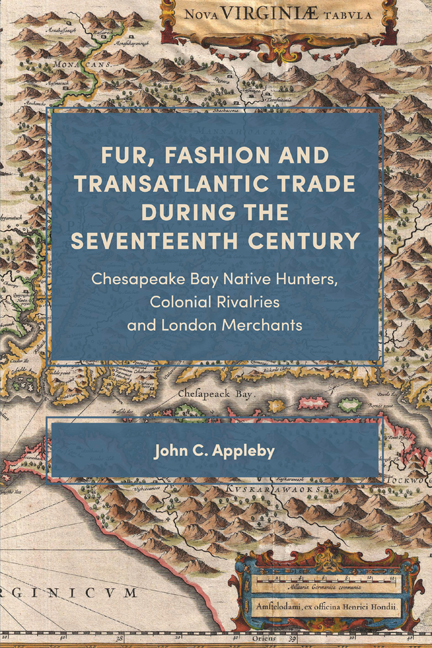 Fur, Fashion and Transatlantic Trade during the Seventeenth Century
Fur, Fashion and Transatlantic Trade during the Seventeenth Century Published online by Cambridge University Press: 15 December 2020
The collapse of the Kent Island partnership left the rival venture in Maryland well-placed to secure control of the fur trade in the upper Bay after 1640. But the prospect of commercial expansion was dashed by the onset of a protracted crisis that threatened the survival of the colony. Civil war in England plunged the Chesapeake into a ‘time of troubles’, marked by disunity, division and conflict. Surprisingly, the interconnections between English events and the development of the North American colonies during the 1640s and 1650s have rarely been examined in detail, though a recent study argues that they contributed to the establishment and greater definition of an English Atlantic, facilitated by more extensive intercolonial communication. But political turbulence across the colonies, manifest in rebellion or insurrection, was intensified within the Bay by the divisive legacy of the 1630s. Thus, the rapid collapse of royal authority revived the opponents of Baltimore. Seeking to exploit these unsettled and potentially favourable conditions, Claiborne made repeated attempts to recover trade and territory which merged with wider ambitions for the reformation of the region. Colonial rivalry was accompanied by widespread native unrest and dislocation, intensified by the impact of hostilities in the north between Huron and Iroquoian groups. Conflict with the Powhatans in Virginia was paralleled by the outbreak of war with the Susquehannocks in Maryland. During a period of barren confusion much of the fur trade in the upper Bay was diverted to Swedish and Dutch outposts in the Delaware. Colonial traders remained active, despite the rivalry and conflict, but these years represented a turning point in interethnic commerce and exchange. Though masked by the turmoil of war and rebellion on both sides of the Atlantic, the collapse of metropolitan interest in fur trading enterprise, combined with a narrowing of colonial opportunities within an embryonic and expanding plantation culture, cast a shadow over the function of native trades. In these circumstances the commercial interruption of the civil war enabled the Dutch to increase their trade in the Chesapeake. The response of the new republican regime in England was to impose regulation over colonial trade and shipping, which pointed towards an exclusionary, imperial direction.
Commerce, conflict and competition during the early 1640s
Commercial enterprise in the upper Bay operated under the constraints of weak economic and political structures characteristic of a small colonial outpost.
To save this book to your Kindle, first ensure no-reply@cambridge.org is added to your Approved Personal Document E-mail List under your Personal Document Settings on the Manage Your Content and Devices page of your Amazon account. Then enter the ‘name’ part of your Kindle email address below. Find out more about saving to your Kindle.
Note you can select to save to either the @free.kindle.com or @kindle.com variations. ‘@free.kindle.com’ emails are free but can only be saved to your device when it is connected to wi-fi. ‘@kindle.com’ emails can be delivered even when you are not connected to wi-fi, but note that service fees apply.
Find out more about the Kindle Personal Document Service.
To save content items to your account, please confirm that you agree to abide by our usage policies. If this is the first time you use this feature, you will be asked to authorise Cambridge Core to connect with your account. Find out more about saving content to Dropbox.
To save content items to your account, please confirm that you agree to abide by our usage policies. If this is the first time you use this feature, you will be asked to authorise Cambridge Core to connect with your account. Find out more about saving content to Google Drive.